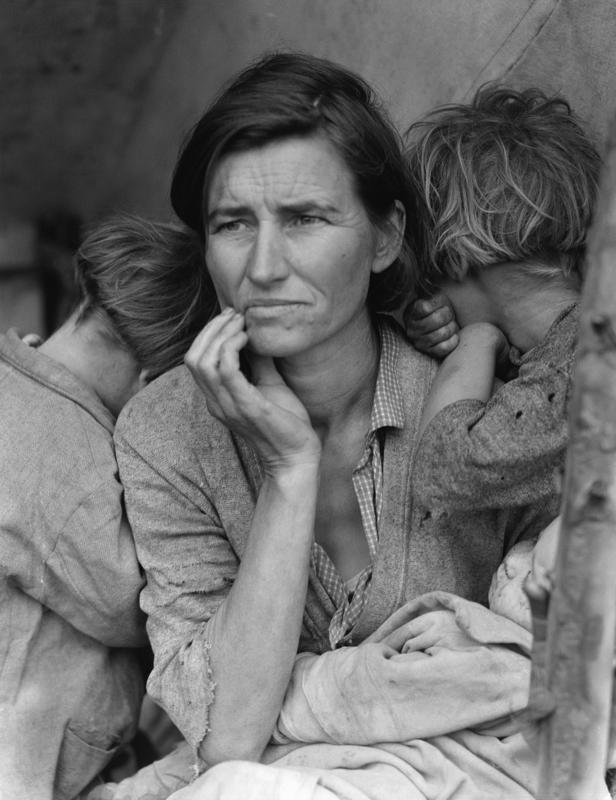More about Human Erosion in California (Migrant Mother)
- All
- Info
- Shop

Contributor
Dorthea Lange follows her intution and captures the most iconic moment of the Great Depression.
Lange's poignant portrait of Florence Thompson and her children is iconic. It conveys the wretched suffering of migrant farm workers during the Great Depression.
In March of 1936, Lange was on her way home after an exhausting month on the road spent alone, photographing the deplorable conditions in California migrant worker camps. She drove by a sign that said Pea-Pickers Camp. Ignoring the sign, she drove on for another 20 miles. Her intuition kept telling her to go back. Turning the car around she drove the 20 miles back to the camp. She learned a cold snap had killed the crops, and the 2,500 migrant workers who lived there were starving.
She met and photographed Florence Thompson, who was sheltering her five children in a canvas lean-to. They were surviving on what was left of the frozen vegetables in the fields and whatever birds her children could catch.
The image was soon published in the San Francisco Chronicle and became famous overnight. The Federal Government immediately sent 20,000 pounds of food. Pressure was put on the California legislature to support social programs aiding farm workers. As fate would have it, Thompson and her family had moved on before the food arrived.
In 1998, the U.S. Postal Service created a stamp with the photograph of Migrant Mother.
Featured Content
Here is what Wikipedia says about Migrant Mother
Migrant Mother is a photograph taken in 1936 in Nipomo, California, by American photographer Dorothea Lange during her time with the Resettlement Administration (later the Farm Security Administration). The 28.3 by 21.8 cm (11 1/8 by 8 9/16 in) gelatin silver print depicts a mother anxiously gazing into the distance, with an infant in her lap and two older children huddling close by. The photo captures the plight of migrant farm workers who arrived in California en masse looking for employment during the Great Depression. Initially anonymous, the woman in the photo was identified as Florence Owens Thompson in 1978, following the work of a journalist for the California-based newspaper The Modesto Bee.
Since its publication, Lange's work has been considered symbolic of the Great Depression. It is in the public domain and has been widely reproduced in educational material, advertisements, and other media. Today, Migrant Mother is considered to be a part of the classic canon of American art and international photography. A print is housed at the Museum of Modern Art in New York City.
Check out the full Wikipedia article about Migrant Mother
















